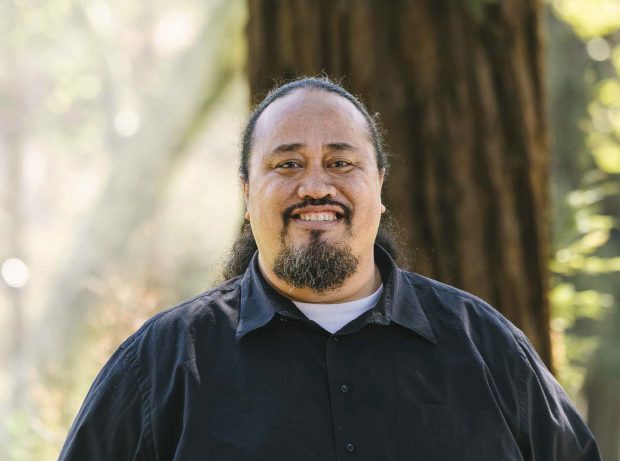
SEFA AINA IS UNABLE to sit still. When he thinks, he taps his fingers on his leg; when he listens, he nods along intently; when he speaks, his face breaks open in a smile as his hands paint vivid pictures in the air around him. Being around him is invigorating, but he asserts just the opposite: for Aina, being here, at Pomona College and surrounded by “students who actively want to take leftover dining hall food and feed it to people, or go mentor low-income kids, or spend their summer working for the PAYS program” is how he stays inspired.
A prominent activist and educator in the Asian American and Pacific Islander (AAPI) community, Aina came to Pomona from his alma mater, UCLA, where he obtained a bachelor’s degree in history and went on to serve as both a counselor and instructor at the UCLA Asian American Studies Center. He recalls his time at UCLA fondly, but remembers being taken aback as a new student by the beautiful buildings, nice statues, fancy food and proliferation of squirrels.
“It’s these sorts of things that make you feel a little awkward,” he explains. “You wonder whether or not you belong. [These universities are] beautiful, wonderful places, but some people aren’t going to feel comfortable or adjusted to the space. There’s privilege. There’s hummus! You don’t feel quite like you fit.”
It’s this feeling of not belonging that Aina sought to alleviate when he became Pomona’s director of the Asian American Resource Center (AARC), and that he continues to work against as the interim director of the Draper Center for Community Partnerships. Aina describes the space he sets out to create for students as one where they can step back from the pressures of school and society and just take a deep breath. “However, it’s important to me that we always become proactive,” he stresses.
Taking identity struggles and turning them into concrete action is at the core of Aina’s activism. During his time at UCLA, the AARC, and now the Draper Center, Aina has established and overseen countless outreach programs in the communities of both Los Angeles and the Inland Empire. In addition to his full-time work at the Draper Center, he also serves as the executive director of the research and advocacy nonprofit Empowering Pacific Islander Communities (EPIC), which breaks down the “AAPI” category and focuses on supporting Pacific Islanders specifically.
This may seem like a lot for one activist and educator to juggle, but it’s nothing for Aina. After all, he was selected from a pool of 25,000 candidates as one of 20 appointees to President Obama’s Advisory Commission on Asian American and Pacific Islanders, on which he served from 2010–2014. The experience, he says “was surreal. I’ve always considered myself someone who would stand outside the White House with a picket sign, and there I was eating the snacks,” he laughs.
At the same time as he was working with the AARC to support AAPI students and advance local social justice activism, Aina was also advising President Barack Obama on the ways his policies were impacting AAPI communities and how his administration could do better. “You have to be able to sustain yourself,” he admits—something he often reminds the budding student activists on Pomona’s campus.
Now that Donald Trump is in the White House, Aina asserts that our collective responsibility is to stay vigilant and active. “We need to understand that the things we do here impact the lives of people around the world,” he says with a firm gesture to the room at large. “The amount of waste and carbon pollution we emit here means that people on islands like Tuvalu, my people, are losing their homeland. They’re environmental refugees. We need to understand the connectedness of things, so that when policies come out, and you say, ‘Oh, that’s not relevant to me,’ you understand that it is. It’s you. It’s your neighbor. We have to always feel empathy and connection to people.”
And for Aina, there’s no better place to start than at home, in the communities. that surround Pomona’s campus. “I have always believed in the power and necessity of engagement, especially for college students. A lot of people applied to get into these desks and these seats,” he says.
Grinning, but eyes serious, he extends a pointing finger. “You got a seat. How are you going to make your seat matter for other people?”
